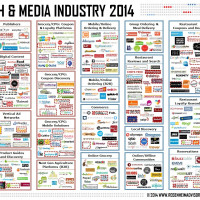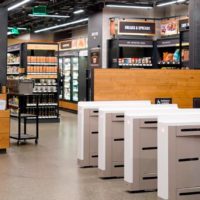
This is a guest post by Jordan Gaspar and Lauren Jupiter, Managing Partners of AccelFoods, an investor in disruptive food and beverage companies.
By now we have had a few weeks to digest the news that Amazon will be acquiring Whole Foods. While startling at first, upon reflection it makes perfect sense. Amazon has been developing its brick-and-mortar strategy; Whole Foods has been trying to “get” online for years, particularly through its burgeoning partnership with Instacart. Consumers now increasingly demand the ability to browse the shelves on and offline for new and exciting natural products. Instead of Amazon building the capabilities from scratch – buy them. It is a $14 billion solution. Plain and simple.
The marriage of these two companies could not have come at a better or more natural time. As consumers have become more educated and more demanding of quality, the industry has boomed. Packaged Facts estimates that the natural foods market reached $69 billion in retail sales in 2016, an incredible 32 percent growth rate over 5 years, and far outpacing flat conventional food growth over the same period. Natural food is no longer a small, alternative piece of the market, due in large part to the success of retailers like Whole Foods who have brought awareness and loyal consumers to this growing market.
At the same time, the natural foods industry is no longer being driven by only mom-and-pop founders. A new generation of entrepreneurs looking to bring their expertise and passion from tech and life-sciences into food are changing the industry. These entrepreneurs are pushing the boundaries of what is standard: new and unique ingredients (see: mushrooms), new marketing platforms, and, maybe most importantly, new methods of sales and distribution. We are seeing the e-commerce phenomenon begin to put a stake-in-the-ground and lead changes in go-to-market strategy across the natural foods industry. Through online retailers like Amazon, food companies have built sizeable businesses, sometimes growing far more quickly (and more profitably) than their brick-and-mortar focused peers. It is an evolution that led us last year to become increasingly focused on e-commerce as a relevant, and in some cases a primary, channel for our brands.
The best way to consider the unification of these retail channels is through the lens of one of our portfolio companies, Four Sigmatic, a mushroom + superfoods company. At launch, Four Sigmatic’s strategy was to sell online through its company controlled e-commerce platform, allowing for custom content to educate consumers about the health benefits of mushrooms while also building a loyal and engaged consumer community. It also enabled the team to test and launch new products with their loyalists, who were excited by new discovery opportunities. Through this test model, the company launched its leading product line: mushroom coffee. After perfecting its product and branding through its e-commerce platform, Four Sigmatic then launched on Amazon. It quickly reached top of the instant coffee category on Amazon, no doubt driven by its passionate consumer base. Fast-forward a year later and Four Sigmatic is in the midst of hockey stick growth, competing with Starbucks Via for the bestseller slot in instant coffee on Amazon. In fact, last week it reached #7 in all coffee and #59 for all grocery (1 spot behind Cheerios).
It was this success online that led to inbound interest from multiple regions of Whole Foods to expand an existing small partnership with Four Sigmatic. Last week, the company learned it will be rolling out nationwide with Whole Foods Global this coming Fall. The line-up online has also been expanded from sachets, single serve units into bagged and pod formats – a true disruption in coffee.
As more and more brands realize the potential of online growth with its ability to scale in a fast and cost-effective way, coupled with the strong marketing opportunity to connect directly with their consumers, we expect to see an increasing subset of brands that will launch online – similarly to Four Sigmatic. Amazon created a shift in the original discovery paradigm of the Whole Foods model – hyper-focused attention to curated, local, natural products talent. If new companies are redirecting their launch strategies to Amazon then the Amazon/Whole Foods deal brings these companies back home. As for Four Sigmatic, we are looking forward to seeing the team take it to a whole new level this year as the Company moves from online to offline.
Check out our complete coverage of the Whole Foods acquisition.
_____________________________
 Jordan Gaspar is a Managing Partner of AccelFoods, an investor in disruptive food and beverage companies. AccelFoods has invested in over 30 portfolio companies across a broad range of categories and regions and works with founders to bridge the gap between their innovative thinking and the resources needed to scale to the highest levels of growth. Jordan is a member of the AccelFoods investment committee and serves as a member of the Board of Directors of Element Snacks and Four Sigmatic, and as a board observer to KidFresh.
Jordan Gaspar is a Managing Partner of AccelFoods, an investor in disruptive food and beverage companies. AccelFoods has invested in over 30 portfolio companies across a broad range of categories and regions and works with founders to bridge the gap between their innovative thinking and the resources needed to scale to the highest levels of growth. Jordan is a member of the AccelFoods investment committee and serves as a member of the Board of Directors of Element Snacks and Four Sigmatic, and as a board observer to KidFresh.
Prior to founding AccelFoods, Jordan was an attorney at Morrison Cohen LLP where she worked in the Corporate department, advising venture and private equity firms and their portfolio companies on acquisitions, sales, mergers, financings, fund formation, leveraged buyouts, and debt financings. She has also served as a Managing Director of Golden Seeds, a national angel network that invests in women-run companies. Jordan graduated from Columbia College and received her J.D. from Fordham Law School.
 Lauren Jupiter is a Managing Partner of AccelFoods, an investor in disruptive food and beverage companies, providing its portfolio with industry access, expertise, and infrastructure to propel innovation and fuel growth. AccelFoods has invested in over 30 portfolio companies across a broad range of categories and regions. Lauren is a member of the AccelFoods Investment Committee and serves as a member of the Board of Directors of Wandering Bear Coffee.
Lauren Jupiter is a Managing Partner of AccelFoods, an investor in disruptive food and beverage companies, providing its portfolio with industry access, expertise, and infrastructure to propel innovation and fuel growth. AccelFoods has invested in over 30 portfolio companies across a broad range of categories and regions. Lauren is a member of the AccelFoods Investment Committee and serves as a member of the Board of Directors of Wandering Bear Coffee.
Prior to founding AccelFoods, Lauren was an investment banker in the Consumer Products and Retail team at UBS where she advised large cap food and beverage companies and consumer-retail focused private equity firms. While at UBS, Lauren worked in strategy on-site at Birds Eye Iglo Group, a leading European frozen food company, owned by Permira Advisers. During her time in business school, Lauren worked in brand management at Unilever. Lauren holds an A.B., cum laude in field, from Harvard College and an M.B.A. with Honors in Finance and Strategic Management from The Wharton School of Business.





